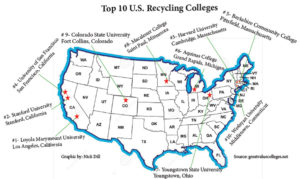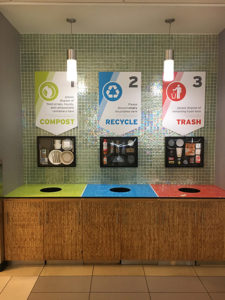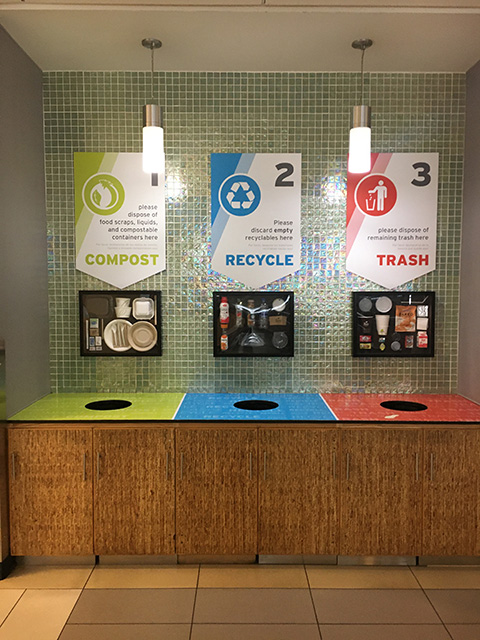by Nick Dill, Student Reporter

Ilda Hershey goes to campus every day at Oklahoma State University with one goal: make the campus cleaner by recycling.
Hershey is the sustainability coordinator at OSU and is in charge of the recycling programs on campus.
Recycling bins are all over the OSU campus and in every residence hall. This is what Hershey observes every day as she walks around campus.
She said she takes pride in her work and loves seeing the impact of recycling on campus.
“I think it’s created a culture of good stewardship of resources, and stewardship is one of the values of Oklahoma State University,” Hershey said. “I think having the bins and having the program shows the culture and awareness for people to start understanding that there is this circular economy, and they can contribute to it.”
Many colleges are trying to make recycling important.
“It’s most important to reduce, not generate the waste, so generate less waste overall,” Hershey said. “That’s why it’s in that order because it’s more sustainable.”
WHY SHOULD PEOPLE
RECYCLE?
So why should people recycle?
Julie Muir, Zero Waste Systems manager at Stanford University, said she believes recycling is important.
Muir said waste reduction is the first step and universities should prioritize creating less waste. She said people should also recycle for future generations to generate business, create jobs and improve the economy.
Muir said people should also recycle to protect the environment and preserve land.
Hershey said individuals should recycle at the university or the city level because people are diverting material from the landfill, and they don’t have to pay to bury it.
Hershey said recycling is seen in everyday things like Amazon boxes.
“So the question is, would we rather cut down trees to make these boxes or would we rather gather everyone’s old boxes and make new boxes ?” Hershey asked.
Hershey said it makes sense to recycle in Oklahoma because the state has places that take recyclable materials.
Hershey said in Oklahoma and in surrounding states it does make sense because there are paper mills that take used paper of any type to make new paper cardboard products. She also said metal smelters will take scrap metal, aluminum cans and food cans.
Hershey said some plastic processors in the state of Oklahoma make plastic lumber, which is one of the plastics that is recycled.
Dr. Steven Mackie is an associate professor of education and co-faculty sponsor of the student organization CORE — Conserving Our Ranger Environment — at the Northwestern Oklahoma State University’s campus in Enid.

‘YOU RECYCLED
EVERYTHING’
Mackie said recycling is not a new idea, and one that has always been around.
“I mean, if you were living on a farm, in the ‘20s, ‘30s, ‘40s, ‘50s, you recycled everything,” Mackie said. “You used that pickle jar for canning purposes or a water glass or a cereal bowl. You use newspapers to wash your windows, and you didn’t buy paper towels. The whole idea of recycling is kind of not new. People have been doing it for thousands of years.”
Mackie said some short term economic impacts occur from recycling.
“It may cost the city or the campus a little bit upfront to get a recycling program going and started, but in the long run, if the community actively recycles, then 50% of less landfill waste goes into the landfill,” Mackie said.
Mackie said recycling is a good first step to get people to really think about how they use the products that they buy.
“When you start recycling, I think it opens up your thinking about maybe not consuming so much,” he said.
Mackie said recycling has gotten people to think about their use of single-use containers.
“Whether it be aluminum cans or plastic bottles or a box from Amazon,” Mackie said, “I think it just raises awareness, but it also makes the janitor’s jobs a lot easier because there’s half the trash in the trash cans.”
Lorenzo Macaluso, the director of client services at The Center for Ecotechnology, said recycling on campus impacts a university culturally, and that sends a message to students and faculty about the importance of sustainability.
Macaluso said a couple of important things about recycling is the quality and organization of materials when recycling. He said if you have the wrong things mixed in there, then it really wreaks havoc on the recycling system.
“One of the main things that the industry has focused on is good quality recycling, separating the right things and making sure that the specs are aligned with where they’re going,” Malculuso said.
IS RECYCLING AN
ECONOMIC FORCE?
Barry Sparks, facilities management outreach and deskside recycling program manager at The University of Colorado Boulder, agrees that people should recycle.
Sparks said recycling is one piece of the sustainability puzzle.
“Sustainability encompasses a broad range of issues, including social justice, climate change, and environmental stewardship,” Sparks said. “ In a consumer-driven society, creating a robust circular economy can be the alternative to the wasteful linear economy consumerism fosters.”
Sparks said he believes people should recycle on campus, too.
“We should recycle everywhere,” Sparks said, “but as students taking leadership roles in the society they will be pursuing careers in, having an on-campus recycling program is one avenue to engage in and practice leadership skills while learning more about the social and environmental benefits of sustainable practices.”
He said a successful program will attract students who are environmentally engaged and will help solve the problems of climate change and social injustice.
Muir said one important thing about recycling that most people don’t realize is that it has many economic benefits, not just environmental benefits.
She said people don’t realize that the job creation caused by recycling is incredible.
“What I try to tell people is, when you put that bottle or that can or that paper into the recycling bin, you start a chain of reactions,” Muir said. “A chain of businesses are going to come into play just because you did that.”
Recycling is a common sight anywhere that people might not even think about.
It does not have to be so complicated, she said.
For example, Muir said she had friends who were fishermen and supported recycling because they learned how harmful the plastic in the ocean is.
She said she was able to tell them how plastics in the ocean impacted fish.
“Even hunters were able to support the plastic bag ban that we had because they got tired of seeing bags in the trees when they’re hunting,” Muir said. “Also, the flooding that the bags can cause if they’re blocking a storm drain or something. So you always try to figure out how it goes back to why people should recycle.”
Hershey said generating less waste is a key tip when talking about why people should recycle.
“Reducing and reusing as much as possible is much more important than recycling,” Hershey said. “We want people to recycle at OSU on campus. I want your plastic water bottle, and I want to recycle it, but even more, I don’t want you to generate that plastic water bottle.”
Recycling on campus helps better market the university in a positive way. Muir said a lot of students want a sustainable university.
“Students want to know that their university is making good judgments on these things,” Muir said. “We do really well in the area of sustainability and waste, and that has been used as a marketing tool. We’re on the Green Schools list. We’re on the Sierra Club list. We’re on the Princeton Review list as being, you know, all these different things.”
Muir said recycling also affects the local community that surrounds the university.
“A lot of programs, the university started, and then the local government then got involved after they saw the stuff that was happening at the university,” Muir said. “I think universities are agents of change in their communities and are respected for that.”
Muir said recycling is important, and people are essential to the system.
“It’s not just a mindless thing that you’re doing,” Muir said. “No matter where you are, you know, you’re at school, you’re at work, you’re at a football game, wherever you are. That decision really makes a difference to get good clean recyclables.”
Sarah Ballew, director of energy and sustainability services at The University of Oklahoma, said people should recycle to reduce emissions.
Bellew said recycling eliminates the need to source virgin materials and reduces emissions associated with the manufacturing processes that would mine and transport virgin materials.
She said the EPA has a WARM calculator that quantifies the emission reductions associated with recycling and waste reduction efforts.
Ballew said a finite amount of space is available on the planet for people to share and live on.
“Landfills are typically placed in low-income areas,” Ballew said. “Landfills can also leach and pollute the environment.”
Ballew said recycling impacts the economy, too.
“While the market value of recycled materials has fluctuated (and dropped) greatly in the last two years, the cost of disposing waste has also increased and will continue to escalate,” she said.
Dana Kelly, program assistant and office manager at the University of Colorado Boulder Environmental Center, said college campuses have a responsibility to implement solutions reducing waste on their campuses.
“Recycling on campus is important because college is a place where students are learning how to be responsible – not only for themselves, but for the world they live in,” Kelly said. “When we start paying attention to the waste we create and how to avoid waste in the first place, we become better world citizens.”
She also said recycling curtails climate change, saves energy, conserves water, and creates jobs.
Mackie said the bottom line of recycling is not a new concept.
“People have been doing it for thousands of years,” Mackie said. “It’s just the right thing to do.”

